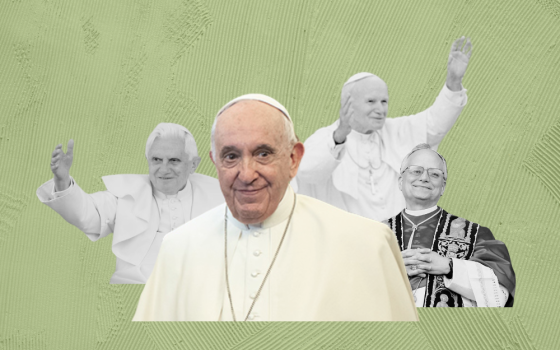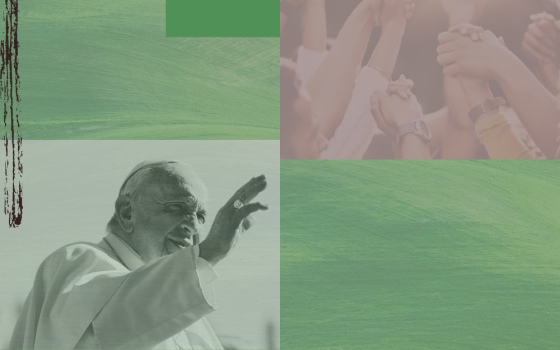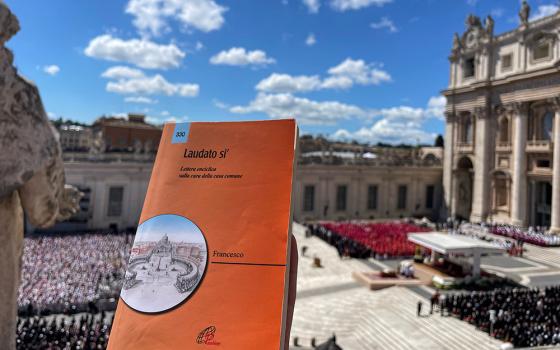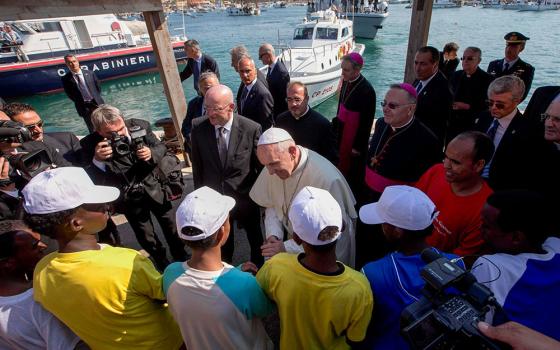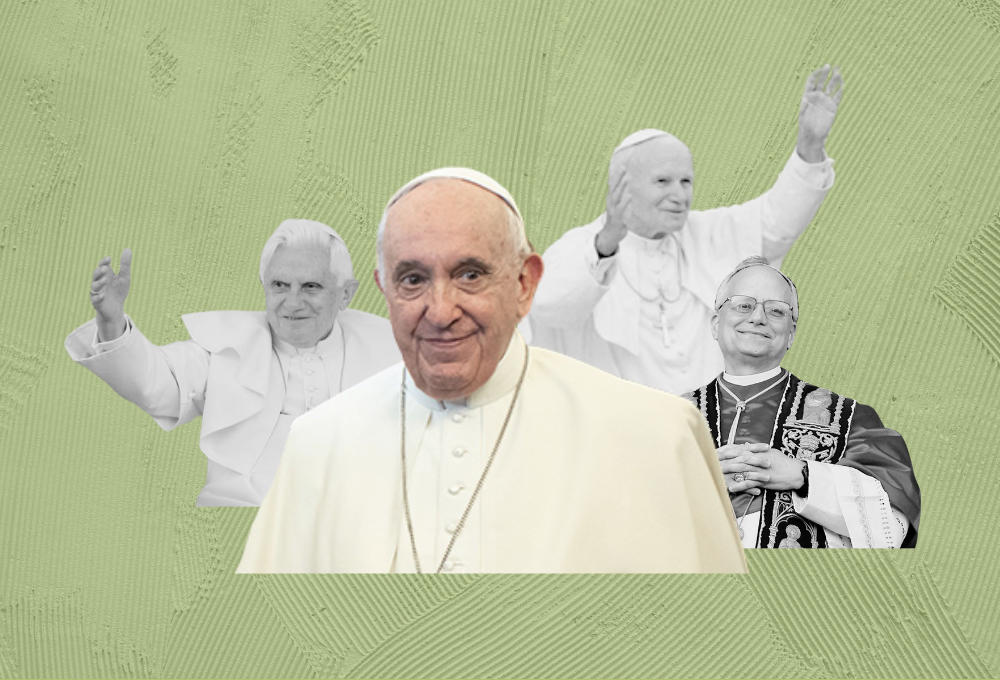
(GSR graphic/Olivia Bardo; photo sources, from left: CNS/Paul Haring, CNS/Vatican Media, CNS file, OSV News/Reuters/Yara Nardi)
In the second of a two-part interview on Pope Francis' theological legacy, theologians Sr. Maeve Heaney and Sr. Maria Cimperman reflect on the late pontiff's relationship with the theological legacy of his predecessor Pope Benedict XVI, and with liberation theology. They also look ahead to Pope Leo XIV's possible contributions to Catholic theology.
Heaney is a member of the Verbum Dei Community who teaches at Australian Catholic University in Brisbane.
Cimperman is a Religious of the Sacred Heart of Jesus who teaches theological ethics and consecrated life at the Catholic Theological Union in Chicago. She is currently living in Rome and serving as synodality coordinator at the International Union of Superiors General, or UISG.
Global Sisters Report: In terms of a theological lens, are there continuities between Francis and Benedict and how they thought?
Heaney: I think there are many. After Francis' death, I saw an Anglican theologian on television make the point that Francis had done a lot for women in leadership, but that doctrinally very little had changed since Benedict. Francis was open to dialogue and he definitely was open to action that would bring women more into dialogue. But the doctrine didn't really change there and he was very cautious about that.
Of course, Benedict was more Augustinian and more intellectual, if that makes sense, whereas Francis was more on the margins, more of a pastoral theologian in terms of outlook and, obviously, coming from Latin America, influenced by the on-the-ground nature of theology as it's done there, and post-Vatican II.
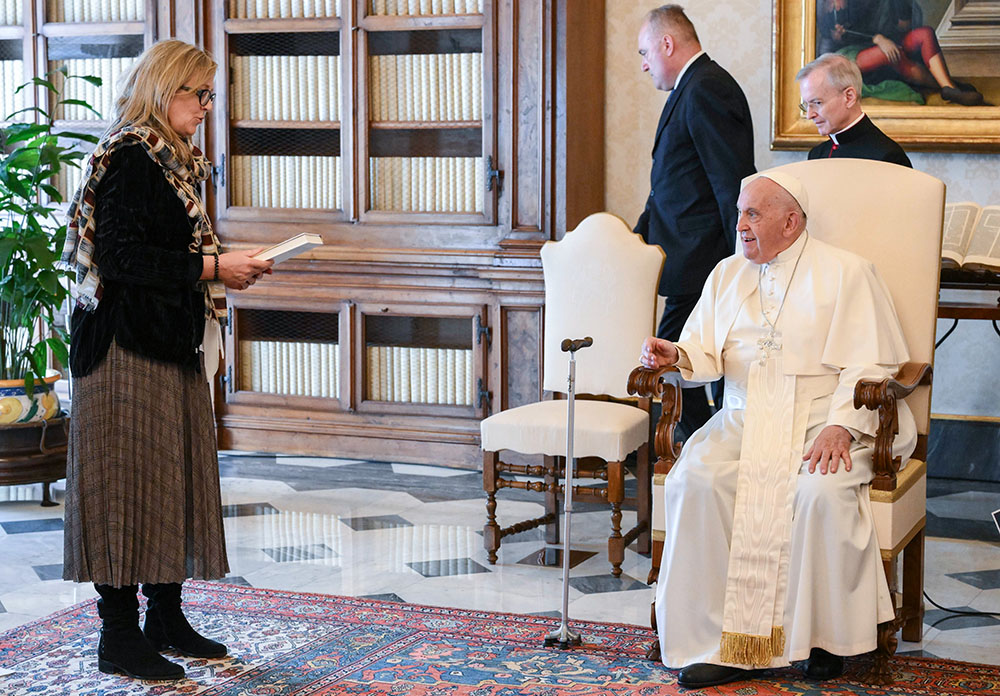
Pope Francis listens as Verbum Dei Sr. Maeve Heaney, director of the Xavier Centre of Theology at the Australian Catholic University, speaks to him on behalf of the International Network of Societies for Catholic Theology in the library of the Apostolic Palace at the Vatican May 10, 2024. (CNS/Vatican Media)
Cimperman: I think they would find themselves on common ground on the issues of the Earth. If you read what they both wrote on Earth and creation, you would look and say, "They both really saw that need for creation and how economies are not serving creation in the relationships to which we are called."
They wrote differently, and many people found Francis easier to read than Benedict, but Benedict had a lot in common with Francis.
There were differences. Benedict, as a scholar and theologian who also taught theology in a university, would engage with great interest current debates. The late [Passionist] Fr. Donald Senior, who served on the Pontifical Biblical Commission, once shared that Cardinal [Joseph] Ratzinger came to the meetings with the keen interest of a scholar, and this continued when he became Pope Benedict XVI.
That is consistent with who he was. He was interested in the cries of the people. His encyclicals on love and hope reflect his understanding of the spiritual needs of people, yet his language required more time and effort. Francis' language was more accessible.
What were other differences?
Cimperman: I agree with Maeve that Francis would have engaged the questions "on the ground" and from the people. His Ignatian DNA would have marked his listening to the people and inviting them to an encounter with Jesus. Francis certainly called us to deepen our relationship in the Word and he also listened to the cries and hopes of the people in front of him. He listened and heard the narratives and sought to find responses. He also called theologians forth to engage the questions of the actual people around us. His closeness to the people and openness to questions modeled a way for us.
I think Francis also, by his nature, was more engaged with narratives, with stories. He would call us [theologians] to say, "Now what do you do?"
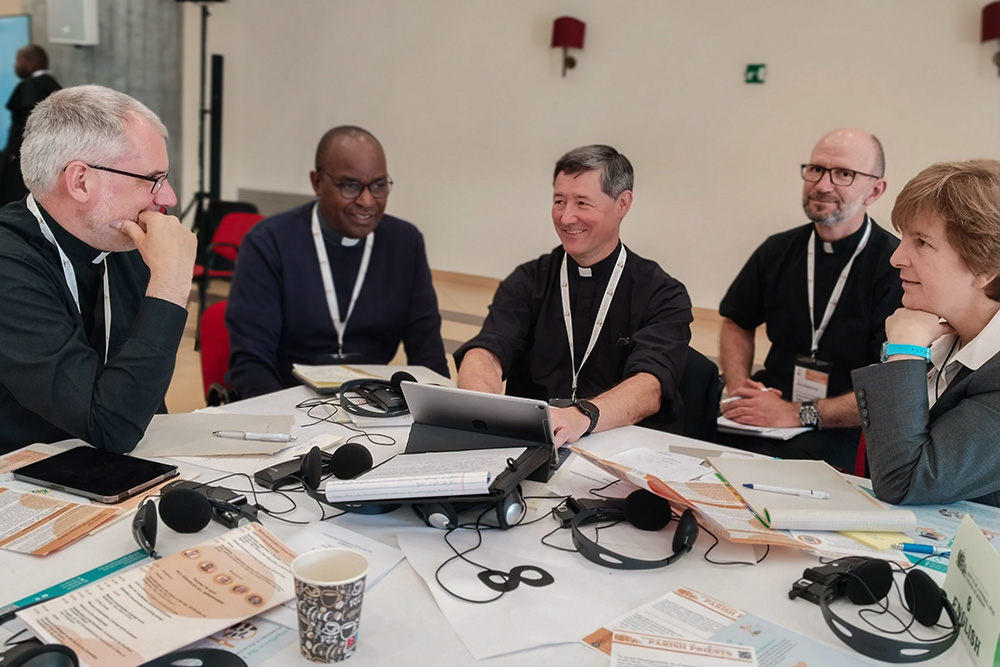
Priests work in an English-language small group April 30, 2024, with facilitator Sr. Maria Cimperman, right, a Religious of the Sacred Heart of Jesus, as part of a meeting of parish priests from around the world gathered at Sacrofano, outside of Rome, to share their experiences and contribute to the ongoing synod on synodality. (CNS/Courtesy of the Synod of Bishops)
The "easy" view is that Benedict was more traditional in his theological views and Francis more progressive. But, in fact, perhaps the two of them met at a certain point?
Heaney: That framing of a more middle ground understanding of [Benedict's] life does make sense. Two things that I find interesting theologically about Benedict.
One is in his first book on Jesus, he explicitly said, "This is a theology book. It's not doctrine." ... Pope John Paul II, with all his gifts, would never have premised any of this writing saying, "Don't take it too seriously, just read it," because he was in magisterium mode the whole time.
Second, the humility of being able to step back [in resigning as pope] and say, "I have to go." I think that was a tremendously humble thing to do.
I don't think Francis was that progressive theologically. I think as a person he was open and warm, and I think theologically what he has allowed us to do is to talk about things that we weren't allowed to before, such as the role of women in the church and the complexity of sexuality and family life. He opened doors. That's really important.
I grew up in a time when there were things that you couldn't talk about, even if it was to agree and disagree. They just weren't on the table to talk about them. And that, for me, that was a huge thing, as how can we explain to the future generations why things are the way they are if we ourselves can't grapple with them?
The tone between Benedict's and Francis' time seemed different.
Cimperman: Maeve is right. During John Paul II and Benedict's time, there were a number of theologians investigated. I don't know of any theologian investigated during Francis' time. I think what he did was trust that theologians could challenge one another and call each other forth. If something is theologically incorrect, we could discuss this with one another.
There were no topics off the table for conversation in Francis' time. He didn't necessarily move them, but he gave space for writing on these topics in a way that people were far more hesitant to publish on topics in sexual ethics before this.
Advertisement
While in Argentina, Francis had a complex relationship with liberation theology, but during his pontificate seemed to embrace elements of liberation theology and paid tribute to Gustavo Gutiérrez.
Cimperman: If liberation theology is about being in solidarity with people made poor, I think he would find himself there. ... That wouldn't be something new that came with his papacy. It came with his relationship with the people.
Francis did liberation theology. He engaged experience and social analysis. He engaged prophetically, naming sin and naming grace. His life and actions did speak of a preferential option for the poor and vulnerable.
What might we expect of Pope Leo XIV, an Augustinian, in the realm of theology? Do you think Francis's "evolutionary" spirit will continue?
Heaney: I think Pope Leo XIV is his own person, but he has made very clear connections already with some of Francis' vision and journey, as well as his prophetic naming of what the world — especially those who most need it — might need. I hear his concern for unity, and I think that's very important. So I am deeply hopeful that the Spirit, through Pope Leo, will lead us forward.
Cimperman: I think we will learn much from an Augustinian spirit. Community, unity and fostering dialogue are already part of his papal lexicon. This seems to be the approach he is encouraging, both continuing Pope Francis' efforts and moving us further along this path. His pastoral experiences and theological and canon law background will come with him as he listens. He will bring these with him on the synodal journey.
"With you I am a Christian and for you I am a bishop" [words of St. Augustine that Leo quoted in his first address as pope] offers a beginning insight. I am very interested in what he will bring and how Pope Leo will continue to grow into his call and ministry of shepherd and bishop of Rome.
He will do much good and he will also make mistakes. May we allow him to walk with us in love and mercy and may we also show love and mercy.




